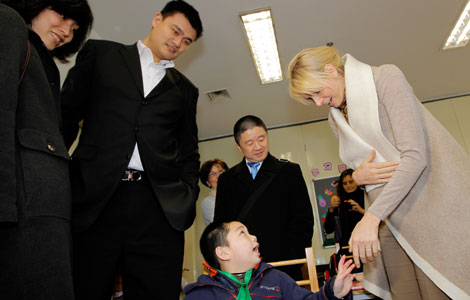 |
|
|
|
||||||||||||||
|
|||||||||||
Cooperatives are a good way to boost farmers' incomes, especially for women farmers, said NPC deputy Feng Leping on the sidelines of the ongoing NPC/CPPCC sessions.
Feng, one of the most successful farmers in China, can speak from her own experience.
The 50-year-old runs the largest watermelon cooperative in Beijing. Her products are sold to high-end customers, including those in Zhongnanhai, the Chinese government's central compound.
|
 |
|
Feng Leping (left), who runs the largest watermelon cooperative in Beijing, visits her watermelon fields. [Provided to China Daily] |
Her cooperative consists of 300 farmers in Beijing and 3,000 from other cities across China. Farmers know that joining Feng's group is almost like crossing the threshold to a secure life.
However, back in the 1980s when Feng became the first in her village to grow greenhouse watermelons, few believed she could turn the cultivation of fruit into a wildly successful business.
The high school graduate was seen as a spoiled wife by her fellow villagers because she knew nothing about farm work.
Feng, the youngest daughter from a relatively wealthy family, was married into a poor family in the southern Daxing district of Beijing in 1984. The district is known for its poverty, as well as being the center of watermelon growing for hundreds of years.
"I used to hold an umbrella and sit next to my farmland without doing anything for an entire day.
"It was not only because I knew nothing about farm work but also because I was thinking all the time about how to avoid living the same way that women in China's countryside have lived for the past centuries," she said.
She saw women in her village working as hard as men on the farmland in the daytime but in the evenings when men got to rest, women still needed to do all the housework.
"The most pitiable part was that they worked so hard but their earnings were so little," Feng said.
Making more money was the motive for her to grow greenhouse watermelons.
In 1992, Feng learned that greenhouse watermelons from the Shunyi district in Beijing sold quite well. So she borrowed 6,000 yuan to start her own greenhouse watermelon business.
"The net profit was 7,000 yuan in 1993, which was not only beyond my expectations but also helped me to win the hearts of some of my neighbors," she said.
Fu Yongyan, a 59-year-old farmer, is from one of the six families in Feng's village that have been following her since 1994.
"I knew at the beginning that Feng would pull this thing off. She was so different from the rest of us in the village. When other women were tied up by housework, she walked out and traveled around like a man to explore new ways of planting," Fu said.
The advantage of using greenhouses to grow watermelons passed from mouth to mouth, leading to strong competition in the market.
The watermelons grown in Feng's village were better in quality compared with others in Beijing, thanks to Feng's cooperation with agricultural research institutes in the city.
But the high quality didn't really boost the sales.
How to make her fellow villagers' fruit stand out among the millions of tons of watermelons on the market became a major task for Feng.
"I started to do branding and packaging for our watermelons in the late 1990s. I named our brand Leping and made sure all the watermelons were sold in unified containers and the fruits were of similar sizes," she said.
Her first big contract was worth 150,000 yuan ($23,700), with each watermelon priced at an average of 20 yuan.
"That was really a lot of money in the 1990s," Feng said.
"I realized that high profit can only come from high-quality products," she said, adding that she then decided to pursue a high-end strategy of growing mainly organic fruits.
To cope with the surging demand for her fruit, she founded the Beijing Watermelon Professional Cooperative in 1997 so that more farmers could benefit from her one-stop service - from providing seeds to training and sales.
On the other hand, the organization had a bigger production capacity and grew watermelons in all seasons because farmers were spread through different cities with various weather conditions.
Now her cooperative's products have expanded to various fruits, vegetables and other foods.
Since 2002, Feng has also included tourism in her agricultural business, which will generate an estimated 60 million yuan this year.
Li Xuejian, the sales manager of the collective since 2002, said that Feng is no doubt the strongest and most powerful woman she has ever seen.
Contact the writer at mengjing@chinadaily.com.cn.
Wu Ying, iPad, Jeremy Lin, Valentine's Day, Real Name, Whitney Houston, Syria,Iranian issue, Sanyan tourism, Giving birth in Hong Kong, Cadmium spill, housing policy

|

|

|

|

|

|